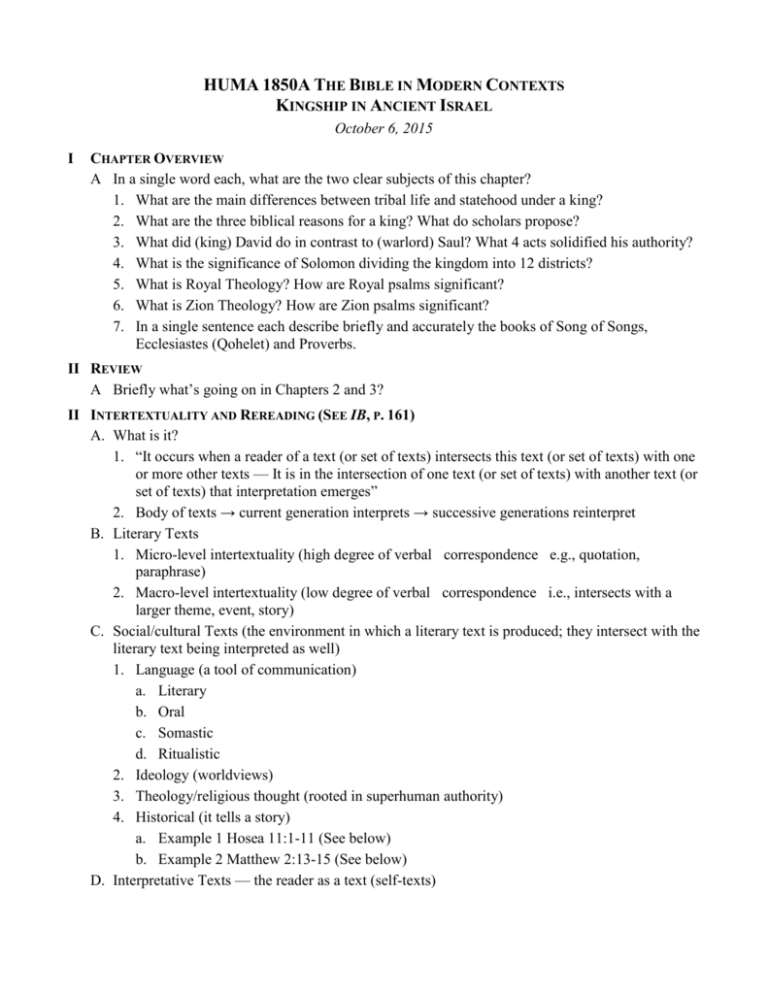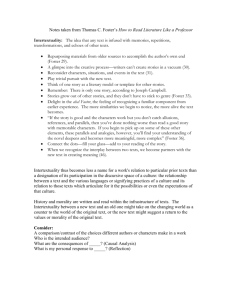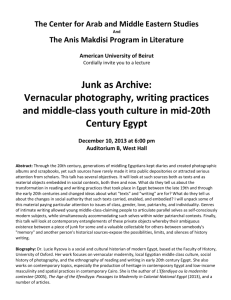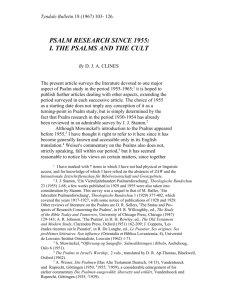lecture outline
advertisement

HUMA 1850A THE BIBLE IN MODERN CONTEXTS KINGSHIP IN ANCIENT ISRAEL October 6, 2015 I CHAPTER OVERVIEW A In a single word each, what are the two clear subjects of this chapter? 1. What are the main differences between tribal life and statehood under a king? 2. What are the three biblical reasons for a king? What do scholars propose? 3. What did (king) David do in contrast to (warlord) Saul? What 4 acts solidified his authority? 4. What is the significance of Solomon dividing the kingdom into 12 districts? 5. What is Royal Theology? How are Royal psalms significant? 6. What is Zion Theology? How are Zion psalms significant? 7. In a single sentence each describe briefly and accurately the books of Song of Songs, Ecclesiastes (Qohelet) and Proverbs. II REVIEW A Briefly what’s going on in Chapters 2 and 3? II INTERTEXTUALITY AND REREADING (SEE IB, P. 161) A. What is it? 1. “It occurs when a reader of a text (or set of texts) intersects this text (or set of texts) with one or more other texts — It is in the intersection of one text (or set of texts) with another text (or set of texts) that interpretation emerges” 2. Body of texts → current generation interprets → successive generations reinterpret B. Literary Texts 1. Micro-level intertextuality (high degree of verbal correspondence e.g., quotation, paraphrase) 2. Macro-level intertextuality (low degree of verbal correspondence i.e., intersects with a larger theme, event, story) C. Social/cultural Texts (the environment in which a literary text is produced; they intersect with the literary text being interpreted as well) 1. Language (a tool of communication) a. Literary b. Oral c. Somastic d. Ritualistic 2. Ideology (worldviews) 3. Theology/religious thought (rooted in superhuman authority) 4. Historical (it tells a story) a. Example 1 Hosea 11:1-11 (See below) b. Example 2 Matthew 2:13-15 (See below) D. Interpretative Texts — the reader as a text (self-texts) –2– IV TUTORIAL (YOU MUST BRING YOUR BIBLES TO EVERY TUTORIAL) READING: 1 Samuel 8 (Saul is made king), Psalms 2, 110, 45 (The Royal Psalms) ASSIGNMENT: See IB p. 57ƒ 1. Do you see evidence of a negative view about kingship in 1 Samuel 8? Give examples. 2. Do you see evidence of a positive view about kingship in the Royal Psalms (2, 110, 45)? Give examples. 3. How would you account for this difference in attitude about kingship between the time the prose was written and the time the poetry was written? A. The King as Sacral Figure 1. The dynamics of ancient kingship a. 1 Samuel 8:1-22 b. Rights of the king c. Social text under judges (1150-1000 BCE) d. Social text under kings (1 Samuel 8:10-20) B. Elevating Kingship to Divine Sonship 1. DH demonstrates ambivalence 2. Royal psalms 3. ANE social text a. Israel b. Egypt (Stele of Sehetep-Ib-Re – see below) c. Mesopotamia (“Petition to a King” – see below) 4. Israelite intertextuality with ANE (Ps 2, 110, 45) a. Biblical materials assert the role of the king as: b. Psalm 2 d. Psalm 45 c. Psalm 110 STELE OF SEHETEP-IB-RE (EGYPT) Worship King Ni-maat-Re, living forever, within your bodies And associate with his majesty in your hearts. He is Perception which is in “(men’s) hearts,” And his eyes search out every body. He is Re, whose beams one sees, He is one who illumines the Two Lands more than the sun disc. PETITION TO A KING (MESOPOTAMIA) To my king with varicolored eyes who wears a lapis lazuli beard, Speak: To the golden statue fashioned on a good day, The … raised in a pure sheepfold, called to the pure womb of Inanna The lord, hero of Inanna, say: “Thou (in) thy judgment thou art the son of Anu, Thy commands, like the word of a god, cannot be turned back, –3– EXAMPLE #1 HOSEA 11:1-11 1 ¶ When Israel was a child, I loved him, and out of Egypt I called my son. 2 The more I called them, the more they went from me; they kept sacrificing to the Baals, and offering incense to idols. 3 ¶ Yet it was I who taught Ephraim to walk, I took them up in my arms; but they did not know that I healed them. 4 I led them with cords of human kindness, with bands of love. I was to them like those who lift infants to their cheeks. I bent down to them and fed them. 5 ¶ They shall return to the land of Egypt, and Assyria shall be their king, because they have refused to return to me. 6 The sword rages in their cities, it consumes their oracle-priests, and devours because of their schemes. 7 My people are bent on turning away from me. To the Most High they call, but he does not raise them up at all. 8 ¶ How can I give you up, Ephraim? How can I hand you over, O Israel? How can I make you like Admah? How can I treat you like Zeboiim? My heart recoils within me; my compassion grows warm and tender. 9 I will not execute my fierce anger; I will not again destroy Ephraim; for I am God and no mortal, the Holy One in your midst, and I will not come in wrath. 10 ¶ They shall go after the LORD, who roars like a lion; when he roars, his children shall come trembling from the west. 11 They shall come trembling like birds from Egypt, and like doves from the land of Assyria; and I will return them to their homes, says the LORD. EXAMPLE #2 MATTHEW 2:13-15 13 14 15 ¶ Now after they had left, an angel of the Lord appeared to Joseph in a dream and said, “Get up, take the child and his mother, and flee to Egypt, and remain there until I tell you; for Herod is about to search for the child, to destroy him.” Then Joseph got up, took the child and his mother by night, and went to Egypt, and remained there until the death of Herod. This was to fulfill what had been spoken by the Lord through the prophet, “Out of Egypt I have called my son.”









